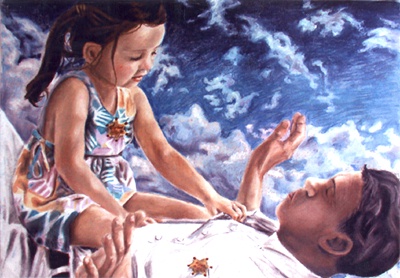All Nonfiction
- Bullying
- Books
- Academic
- Author Interviews
- Celebrity interviews
- College Articles
- College Essays
- Educator of the Year
- Heroes
- Interviews
- Memoir
- Personal Experience
- Sports
- Travel & Culture
All Opinions
- Bullying
- Current Events / Politics
- Discrimination
- Drugs / Alcohol / Smoking
- Entertainment / Celebrities
- Environment
- Love / Relationships
- Movies / Music / TV
- Pop Culture / Trends
- School / College
- Social Issues / Civics
- Spirituality / Religion
- Sports / Hobbies
All Hot Topics
- Bullying
- Community Service
- Environment
- Health
- Letters to the Editor
- Pride & Prejudice
- What Matters
- Back
Summer Guide
- Program Links
- Program Reviews
- Back
College Guide
- College Links
- College Reviews
- College Essays
- College Articles
- Back
"This I Believe..."
While it has always been said that nothing can amount to the impact of a great teacher, I believe that the raw, authentic value of pain teaches more lessons than any numerable amount of hours pondering at a desk could prove. How is one to comprehend the complex significance of an occurrence or a seemingly inconsequential individual if we cannot begin to understand the astronomic perplexity that is the burden of human existence itself? Although the gravity and individuality of pain is vast in its distinctions, each and every mortal knows all too well the excruciating, abiding ache of its sting. Abandonment, rejection, injury, loneliness- all harrowing and intimate prospects. And yet, such wisdom cannot be learned in any alternate way. Not in the contemplation of the scientific and sterile aspects of technology or subjective bureaucratic thought. Not in the great many hours of studying Sophocles or any other ancient figurehead of psychological revelation– no. There is only that one thing that binds us as an imperfect, yet unified, human race: that connection which we learn through bilateral suffering.
My mother, a blatant woman with a shock of curly hair, has always told me that nothing in life will ever get much better without first getting much worse. In my youthful mind that sounded like an old horror story – one to be carefully forgotten before the time I crawled into my bed at night. Yet its prevalence would continue to remain with me throughout the coming years of my adolescence.
The story that follows is one that is grievously growing in familiarity in the American society. A story of what was once a cheerful, conventional family that was haltingly corroded away by tension and divorce. While this fissure was a great source of turbulence and pain, it was only the beginning of my struggles. Driven by disease, emotional stress and addiction, my father had become a ghost of his former self. The devils of his past had come back to plague him and I could only watch as he rotted and mutated into a creature I could not recognize. Simply being around him was dangerous. Therefore, having thus convinced myself that this was the only way, I made the decision to speak out in defense of the father I knew was locked somewhere deep within that monster. A day later, I experienced one of what I have to come to believe to be the most agonizing of pains: disownment.
My heart was ravaged. The agony of betrayal and the insecurity of then questioning the solidarity of my relationships was terrifying. I was tormented by the idea that the decision I had made was a foolish one. And yet, as time slipped by, I began to think. With each passing day, I came to realize that while I was locked in a perpetual battle with my own personal demons, so too were others. In having seen the painstaking disintegration of my father, I began to recognize the manifestations of pain in everyone I came into contact with. Yet I did not only see pain; I started to truly witness the most pure of joys. Finally, I understood. It was only through the replete experience of my suffering that I saw who, in the tendentious and oftentimes blank eyes of the world, Stratton was. What my mother had always said was true: things only did get better after they had gotten worse. It was solely through this time of watching the father I had known die, in a sense, that I was given the understanding that I needed to appreciate true joy– for it is only through the apperception of others, through pain, that we truly learn to understand ourselves and the value of the fleeting life which we all have been granted. This I believe.

Similar Articles
JOIN THE DISCUSSION
This article has 0 comments.